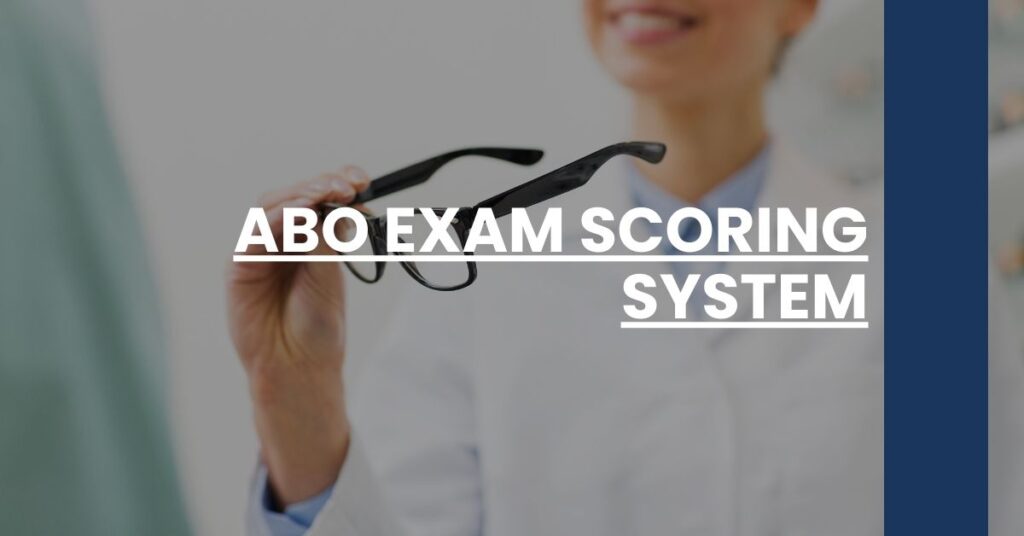The ABO exam scoring system is a pivotal factor in determining the competency of opticians.
Candidates receive a preliminary score immediately post-exam, with final results delivered after a thorough psychometric analysis. A score of 70 or more is a pass, and detailed feedback is provided to help hone future performances.
If you only read this introduction, know that:
- The ABO exam is scored on a scale with a passing threshold of 70.
- Immediate and final scores reflect your opticianry competency.
- Detailed score reports guide your ongoing professional development.
Understanding this scoring can be the key to not only passing but excelling in your opticianry career.
- Introduction
- What Is the ABO Exam?
- Overview of the ABO Scoring System
- Passing Scores and Certification Levels
- Components of the Exam Affecting the Score
- How Scores Are Calculated
- Score Reporting: What You Receive After the Exam
- Score Review and Re-evaluation Process
- How to Prepare for the ABO Exam
- Common Questions and Concerns About ABO Scoring
- Conclusion
Introduction
If you’re gearing up to take the American Board of Opticianry (ABO) exam, it’s essential to understand how the ABO exam scoring system will evaluate your knowledge and competencies. Whether you’re a new entrant into the field of opticianry or a seasoned professional seeking formal recognition, a thorough grasp of the scoring mechanics equips you to better prepare and strategize for success. Beyond just pass or fail, the nuances of the scoring process can reveal much about your strengths and growth areas in the realm of ophthalmic dispensing. Let’s delve into the nitty-gritty of the ABO scoring system to demystify it for you.
What Is the ABO Exam?
The ABO exam, formally known as the National Opticianry Competency Examination, is the gateway to becoming a certified optician in the United States. Serving as a standardized assessment, it is crafted to validate your proficiency in the fundamental skills and knowledge required in the optical field. In essence, the exam scrutinizes your ability to understand prescriptions, fit and dispense eyewear, and ensure patient-centered optical care.
Who Should Take It?
Certification Candidates: You’re likely considering the ABO exam if you’re aiming to secure national certification that attests to your skills as an optical professional. Experienced Professionals: Even if you’ve been in the field for years, you may find that obtaining this credential validates your expertise and potentially opens new career pathways or enrichment opportunities.
What’s on the Exam?
Analyzing Prescriptions: Can you interpret and handle complex optical prescriptions? Fitting Eyewear: Are you adept at adjusting frames and ensuring the right fit for diverse clients? Lens Technology & Design: Do you understand the latest advancements in lens technology and how they benefit consumers? Business and Law: How well do you navigate the intersecting lines of commerce, customer service, and regulatory requirements?
Overview of the ABO Scoring System
As you approach the ABO exam, the question isn’t just whether you’ll answer the multiple-choice questions correctly—it’s also about how those answers translate into scores. The ABO scoring system employs a standardized metric that ensures fairness and consistency across all examinees.
The Types of Scores
When you complete the ABO exam, you’ll get a preliminary score that gives you an immediate indication of your performance. While this score isn’t official, it provides an instant snapshot of how you did. Within several weeks, you’ll receive a final score, meticulously computed and verified through psychometric methods to ensure accuracy and reliability.
Scale Used
Your exam results aren’t feedback in raw numbers alone; they reflect a composite score calibrated on a scale that aligns with industry standards. The numbers you see represent competencies across multiple performance domains, ensuring a comprehensive portrait of your capability as an aspiring optician.
Passing Scores and Certification Levels
With the ABO exam, a passing score isn’t just a milestone—it’s an affirmation of professional readiness. A score of 70 or above is the threshold for certification. This number isn’t arbitrary; it’s carefully considered by industry experts to represent a level of proficiency you need in the optical field.
Gradations of Success: Achieving a passing score is an accomplishment in itself, but certain scores may distinguish you further. Understand that the scoring system is designed not only to qualify competent individuals but also to highlight those who perform exceptionally.
Components of the Exam Affecting the Score
What exactly does the ABO exam scoring system take into account? It’s a combination of knowledge, application, and critical analysis across different sections.
Knowledge Areas and Weight
- Optical Theory and Practice: Here you prove your foundational understanding—this is a core segment with substantial weight in your score.
- Practical Application: Applying theory to real-world scenarios is crucial. How you perform here greatly impacts your final score.
- Analytical Skills: Your ability to analyze optical problems and devise solutions demonstrates critical thinking and decisiveness.
Section Contributions
Every section of the exam holds a piece of the overall scoring puzzle. Some sections may carry more significance—these are typically areas considered fundamental to daily opticianry work and bear a heavier impact on your final score. This detailed breakdown gives insight into how crucial each component is.
By unraveling the components of the ABO exam and how they affect your score, you’re better positioned to focus your studies strategically. As you continue, remember that your aim is not merely to memorize but to internalize and apply this knowledge skilfully—an endeavor that can set you apart in your field.
How Scores Are Calculated
As you prepare to tackle the ABO exam, it’s crucial to understand that your score isn’t just a tally of right answers. Instead, it’s carefully calculated through a process that aims to evaluate your comprehension and ability to apply crucial optical knowledge effectively.
How It’s Done:
- Raw Scores: Initially, each correct answer contributes to your raw score.
- Scaled Scoring: The ABO uses a scaled score to maintain consistency across different versions of the exam.
- Psychometric Analysis: After your preliminary score is given, a final score is calculated, factoring in the difficulty of the questions and other statistical properties. This ensures fairness and accuracy.
As you dive deep into the methodology, remember that focusing on both breadth and depth in your studies will serve you well, considering the ABO exam scoring system is more about the demonstration of knowledge than the mere recollection of it.
Learn more about the ABO exam and its intricacies through this informative resource.
Score Reporting: What You Receive After the Exam
Once you’ve flexed your optical muscles and completed the ABO exam, you’ll eagerly await the results. What can you expect in your score report?
Your Score Report Includes:
- Scaled Score: The main event, displaying how well you performed.
- Pass/Fail Status: Lower stress levels with a clear pass or fail result.
- Performance Analysis: Review your strengths and areas in need of improvement—an invaluable tool for continuous learning.
Digesting Your Report: Take the time to analyze this feedback. Seeing where you excelled can boost your confidence, while understanding where you didn’t do as well as expected offers a roadmap for advancement.
The final score report is your key to unlocking insights and growth opportunities to help refine your craft further. Check your results here once they’re available.
Score Review and Re-evaluation Process
What if, upon receipt of your score report, something seems amiss? Or perhaps you’ve barely missed the mark and are considering requesting a behind-the-scenes glance at the score calculation process.
If you feel compelled to seek a score review, remember that:
- Requests Should Be Prompt: Time is of the essence; review requests typically have a deadline.
- Additional Fees May Apply: Consider the cost of score re-evaluations and budget accordingly.
- Outcome Isn’t Guaranteed: While discrepancies are rare, your score may or may not change after a review.
This process underscores the ABO exam scoring system’s commitment to precision and transparency, though it’s seldom utilized given the rigorous nature of the scoring methodology.
How to Prepare for the ABO Exam
As the saying goes, ‘Knowing is half the battle.’ Now that you’re acquainted with how the ABO exam scoring system works, it’s time to focus on how to ensure your score reflects your true potential.
Expert Tips for Exam Preparation:
- Start Early: Give yourself ample time to explore all topics adequately.
- Study Smart: Focus your efforts on areas that will contribute most significantly to your score.
- Practice Makes Perfect: Complete practice exams to familiarize yourself with question formats and timing.
For optimal preparation, consider resources like the National Academy of Opticianry (NAO), which offers courses tailored to future opticians. With diligent preparation, surpassing the score of 70 is an attainable goal. Explore study options and advice on this helpful forum.
Common Questions and Concerns About ABO Scoring
When it comes to the ABO exam scoring system, it’s typical to have a few lingering questions:
- Can I retake the exam if I don’t pass? Retakes are permitted, but familiarize yourself with designated waiting periods and fees.
- How long are my scores valid? Certification renewals are part of your professional journey. A passing score ushers you into the certified world, but staying current is key.
- Does my score impact my job opportunities? Passing the ABO exam isn’t just fulfilling a requirement—it’s showcasing your commitment and expertise, both of which can unlock new career doors.
Don’t let uncertainties cloud your exam readiness. While specifics may vary, the robust design of the ABO exam scoring system aims to ensure that only qualified individuals earn their credentials.
Conclusion
As we conclude this exploration of the ABO exam scoring system, it’s crucial to recognize that this intricate process is more than just a barrier to entry—it’s a means to certify that every optician has the knowledge and skills to provide optimum care.
Armed with extensive information about the exam’s inner workings, you’re not just preparing to take a test. You’re preparing for a thriving career in opticianry, where every point on your score report is a reflection of your passion and proficiency.
Embrace this opportunity to shine, and trust in the ABO exam scoring system to accurately capture your hard-earned expertise. When you’re ready, step into the exam room with confidence, knowing you’re well-equipped to tackle this significant career milestone.

